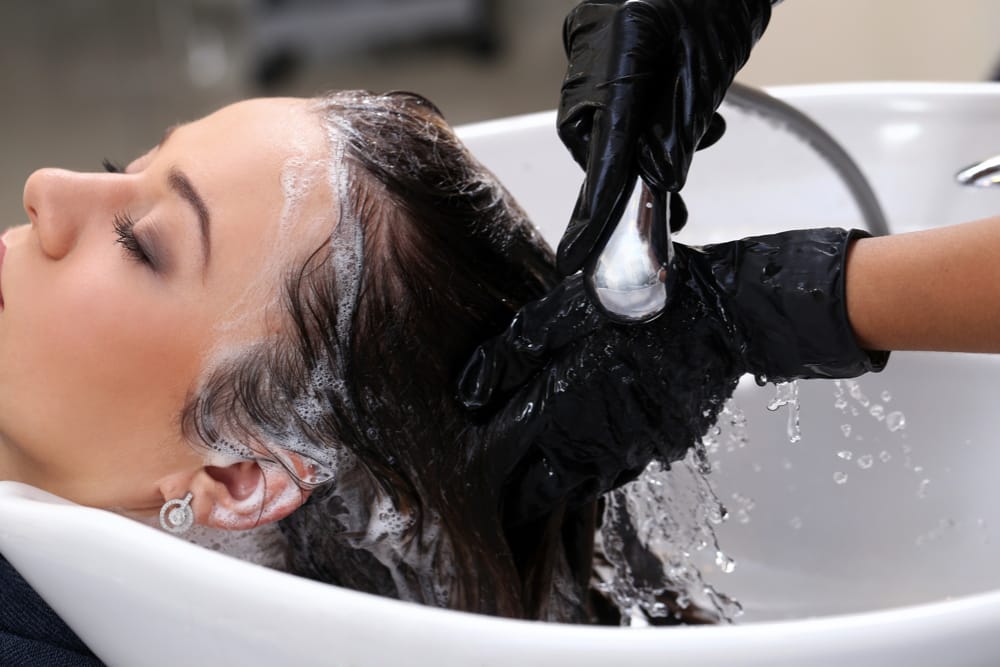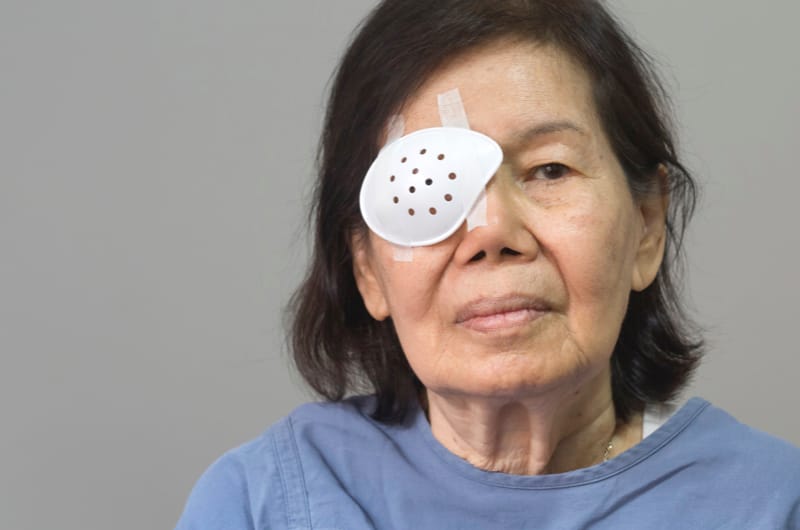Showering and washing your hair is a matter of basic hygiene, but after cataract surgery, you need to be careful with both. After 24 hours of surgery, you can shower and shampoo when you’ve visited the doctor’s office and removed the eye shield. You need to be careful of the water pressure and avoid getting splashed with water in your eyes. Using a mild and baby shampoo is advised. Getting your family member to help you wash your hair in the sink or using dry shampoo are alternative options. Just make sure your eye is protected at all costs.
Cataract surgery involves replacing your lens with an intraocular lens transplant, and aftercare is essential for the eye to heal correctly.
The surgery usually doesn’t require one to stay overnight, and once back home, you wonder how you would even take care of your hair.
Of course, washing the hair means exposing the eye to millions of issues. And with the protective eye cover, when will it be that you can finally wash your hair?
The surgery requires you to take one to two weeks off from work, but that doesn’t mean you can stay with the greasy hair.
The shampooing of hair comes with specific do’s and don’ts. Let’s see when you can finally have fresh smelling hair.
Cataract surgery aftercare
Receiving a cataract surgery implies that you suffered from the clouding of your eye lens.
If not treated on time, cataracts can even lead to permanent vision loss, so the surgery does come as a breath of fresh air.
This surgery is the most common and safest in the U.S., but the aftercare does need you to be careful when it comes to doing certain things.
Since most people are allowed to go home the same day, they need to be careful for the following night and the next day.
Usually, a significant improvement can be seen on the first day itself, but the healing journey continues for a month.
Restrictions after cataract surgery
Giving a pause to strenuous activities is necessary to help heal your eye faster.
Avoiding activities such as heavy exercises, lifting things, and sports should be avoided until further instructions from your doctor.
The following restrictions also seem reasonable:
- Swimming
- Touching your eyes
- Using face cream or lotion
- Using hot tubs and saunas
- Dusting and gardening
- Coloring or perming your hair for 1 to 2 weeks
- Using face cream or lotion
- Wearing eye makeup
Using hot tubs or saunas does sound like a reasonable restriction, and so does others, but one can’t remain without showering and shampooing for two weeks.
Plastic shield for aftercare
After the surgery has been safely performed, the patient generally leaves the hospital with a clear shield covering their eye, similar to an eye patch.
This is necessary because the eye can’t be exposed to the world immediately. As a safety measure, the plastic shield will keep the eye away from dust and pollution.
Day after surgery, this shield remains on the patient’s eye for the remainder of the day after the surgery, the following night, and the next day.
The shield can only be removed if you need to put doctor-advised eye drops and then tape back up.
But the shield doesn’t remain for too long as you have to visit the doctor for a routine checkup the next day.
They see if the surgery was accomplished successfully and if there’s any sign of infection or not.
After they’re done looking at your eye, an ophthalmic technician will remove the shield.
You only need to wear it for a week after surgery at night when you’re sleeping, and during the day, you can be your comfortable self.
Showering and shampooing after cataract surgery

You can shower or shampoo after removing the shield the next day after the surgery, but this comes with strings attached.
Until then, it’s best for you to not take a shower and let the doctors examine your condition after receiving surgery.
When you’re back from the doctor, and the shield has been removed, you can take a shower.
The only thing you have to be careful about is to make sure the water pressure is low, so the water doesn’t enter your eyes.
The shampoo should be mild and slowly applied to the scalp, and rinsed slowly.
The best way is to let someone shampoo your hair in the sink, and they can be careful not to let the water and shampoo get into your eyes.
If you’re living alone, then make sure you do everything carefully.
After the surgery, a forceful splash of water, dirty water, shampoo, or soap shouldn’t get into your eyes for the first few days.
While shampooing is usually the best way to get a fresh smelling head of hair, it’s not the only way to keep your hair oil-free.
It’s right to feel scared as you need to make sure nothing goes into the eyes. So, just like for a lazy hair day, you use dry shampoo the similar can work wonders after the surgery.
Make sure you keep your eyes closed and ask someone to spray it on your scalp.
If you’re doing it on your own, then do it slowly and in the direction opposite to your face.
Washing your face after cataract surgery
When washing your face, make sure that you don’t splash water directly on your face or stand below the shower and let the water hit you on the face.
Face washing can be resumed after returning from the doctor’s office the following day.
Instead, get a wet washcloth and dampen your face. Then carefully apply soap except the area surrounding the eye, and wipe the face clean with the wet washcloth.
After-care is generally tricky and requires the patient to be diligent about not getting water or soap in their eyes for days after surgery.
It might delay your healing and cause a possible eye infection and other postoperative complications.
FAQs
When can I bend over to wash my hair after cataract surgery?
Bending down after receiving cataract surgery is a dangerous thing to do for the healing of the eyes.
After the surgery, you’ll be asked not to do any strenuous activities for a while, including bending down or heavy lifting something, doing sports, and doing other things.
When washing your hair, your head should be tilting backward in the shower with low water pressure.
The best thing would be to get your hair cleaned by someone in the sink so they can do it much more carefully.
What is the fastest way to recover from cataract surgery?
The fastest way to recover from cataract surgery is to carefully follow your doctor’s advice and instructions.
Doing everything, they told you to take care of the eye will help the healing process go faster and without any infections.
If they say avoiding strenuous activities will help you, then in doing so, you’re immediately on the right track.
In a week or two, you can even start to go back to work. Take the medications and eye drops when they need to be taken.
Call a family member to assist you for a week so you can focus on healing.
Can I sleep on my side after cataract surgery?
The first night when you come back home after receiving surgery can be difficult. But sleeping straight with your face towards the ceiling is the right position.
Even if you want to sleep on your side, you might turn on the side of the eye that hasn’t received surgery.
The first 24 hours are crucial.
After you’ve come back from the doctor’s visit, you’ll be asked to use the shield for the next one or two weeks but only during sleeping. It’s done, so you don’t end up hurting your eyes.
What are the most common problems after cataract surgery?
A cataract is a safe surgery and doesn’t usually create problems in the patients who receive them.
But sometimes, a person might experience the following issues:
– Blurry vision
– Dry eyes
– Discomfort or feeling that something is in the eye
– Posterior capsule opacity
– Glare, halos, and other unwanted images
– Light sensitivity
– Nausea or disorientation
– Bloodshot or red eye
– Floaters or flashes of lights
– Droopy eyelid
To summarise
Cataract surgery is usually the safest procedure globally and is pretty quick, taking only half an hour to get it done.
But the aftercare procedure usually requires a lot of effort from the patient.
It might seem your eyesight feels better only a day after the surgery, but the healing process can take as long as a month.
For the first two weeks, you need to make sure nothing goes into the eye and affects it.
When it comes to showering and shampooing, it’s okay to do it after 24 hours as long as you don’t get water or soap into your eyes. If it does, then immediately see your doctor.


